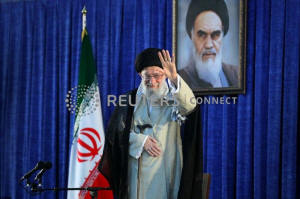|
Iran says U.S. sanctions on Khamenei mean
end of diplomacy
 Send a link to a friend
Send a link to a friend
 [June 25, 2019]
By Parisa Hafezi [June 25, 2019]
By Parisa Hafezi
DUBAI (Reuters) - New U.S. sanctions
against Iran's supreme leader and foreign minister have closed off
diplomacy, Iran said on Tuesday, blaming the United States for
abandoning the only route to peace just days after the two foes came
within minutes of conflict.
U.S. President Donald Trump signed an executive order imposing sanctions
on Monday against Supreme Leader Ayatollah Ali Khamenei and other senior
figures. Sanctions against Foreign Minister Mohmmad Javad Zarif are
expected later this week.
The moves came after Iran shot down a U.S. drone last week and Trump
called off a retaliatory air strike minutes before impact, which would
have been the first time the United States had bombed Iran in decades of
hostility between them.
Trump said he decided at the last minute that too many people would die.
"Imposing useless sanctions on Iran's Supreme Leader and the commander
of Iran's diplomacy is the permanent closure of the path of diplomacy,"
Iranian Foreign Ministry spokesman Abbas Mousavi said on Twitter.
"Trump's desperate administration is destroying the established
international mechanisms for maintaining world peace and security,"
Mousavi tweeted.

In a televised address, President Hassan Rouhani said sanctions against
Khamenei would have no practical impact because the cleric had no assets
abroad.
Rouhani, a pragmatist who won two elections on promises to open Iran up
to the world, described the U.S. moves as desperate and called the White
House "mentally retarded" - an insult Iranian officials have used in the
past about Trump but a departure from Rouhani's own comparatively
measured tone.
Rouhani and his cabinet run Iran's day-to-day affairs, while Khamenei,
in power since 1989, is Iran's ultimate authority.
"The White House actions mean it is mentally retarded," Rouhani said.
"Tehran's strategic patience does not mean we have fear."
Russian Foreign Minister Sergei Lavrov said the situation around Iran
was developing toward a dangerous scenario, RIA news agency reported.
"OPEN DOOR"
Trump's hawkish national security adviser, John Bolton, visiting Israel,
repeated earlier offers to hold talks, as long as Iran was willing to go
beyond the terms of a 2015 nuclear deal with world powers which Trump
abandoned last year.
"The president has held the door open to real negotiations to completely
and verifiably eliminate Iran's nuclear weapons program, its pursuit of
ballistic missile delivery systems, its support for international
terrorism and other malign behavior worldwide," Bolton said in
Jerusalem. "All that Iran needs to do is to walk through that open
door."
The United States has imposed crippling economic sanctions against Iran
since last year, when Trump withdrew from an agreement between Tehran
and world powers to curb Iran's nuclear program in return for the
lifting of sanctions.

The crisis has escalated sharply since last month, when the Trump
administration tightened the sanctions, ordering all countries to halt
purchases of Iranian oil.
That has effectively starved the Iranian economy of the main source of
revenue Tehran uses to import food for its 81 million people, and left
Iran's pragmatic faction with no benefits to show for its nuclear
agreement.
[to top of second column]
|

Iran's Supreme Leader Ayatollah Ali Khamenei waves his hand as he
arrives to deliver a speech during a ceremony marking the 30th death
anniversary of the founder of the Islamic Republic Ayatollah
Ruhollah Khomeini in Tehran, Iran June 4, 2019. Official Khamenei
website/Handout via REUTERS

Washington says the 2015 agreement reached under Trump's predecessor
Barack Obama did not go far enough because it is not permanent and
does not cover issues beyond the nuclear program, such as missiles
and regional behavior.
Iran says there is no point negotiating with Washington when it has
abandoned a deal that was already reached.
The downing of the U.S. drone - which Iran says was over its air
space and the United States says was international skies - was the
culmination of weeks of rising tensions that had begun to take on a
military dimension.
The United States and some regional allies have blamed Iran for
attacks on tankers in the Gulf, which Tehran denies. Washington's
European allies have repeatedly warned both sides of the danger that
a small mistake could lead to war.
Russian Security Council Secretary Nikolai Patrushev came to Iran's
support, saying the drone was in Iranian airspace when it was shot
down and that the evidence on the tanker attacks was of poor quality
and unprofessional, not enough to draw conclusions.
During a visit to Jerusalem, Patrushev also said it was unacceptable
to portray Iran as a threat to international security and called for
restraint to help defuse the situation.
Washington says forcing Iran to the table is the purpose of its
sanctions. Tehran has said it is willing to talk if the United
States lifts the new sanctions first, although Tuesday's statements
appear to toughen that stance.
Trump is leaving a path open to diplomacy with Iran but Tehran would
be making a mistake if it interprets his restraint over the downing
of a drone as weakness, U.S. disarmament ambassador Robert Wood told
a conference in Geneva.

"We will not initiate a conflict against Iran, nor do we intend to
deny Iran the right to defend its airspace but if Iran continues to
attack us, our response will be decisive," he said.
U.S. officials have launched a diplomatic campaign to rally their
allies in the face of the escalating crisis. Foreign Secretary Mike
Pompeo jetted to the Middle East on Monday to meet leaders of Saudi
Arabia and the United Arab Emirates, Gulf Arab states that favor the
toughest possible line against Iran.
The U.S. envoy on Iran, Brian Hook, is visiting Europe, where he is
likely to get a frostier reception from allies who support the
nuclear deal. They believe Trump's decision to quit the accord was a
mistake that has strengthened Iran's hardline faction, weakened its
pragmatists and endangered regional peace.
Iran says it still aims to comply with the nuclear deal, but cannot
do so indefinitely unless it receives some benefits. It has given
European countries until July 8 to find a way to shield its economy
from U.S. sanctions, or else it will enrich uranium to levels banned
under the deal.
(Reporting by Parisa Hafezi; Writing by Peter Graff; Editing by Jon
Boyle/Mark Heinrich)
[© 2019 Thomson Reuters. All rights
reserved.]
Copyright 2019 Reuters. All rights reserved. This material may not be published,
broadcast, rewritten or redistributed.
Thompson Reuters is solely responsible for this content. |